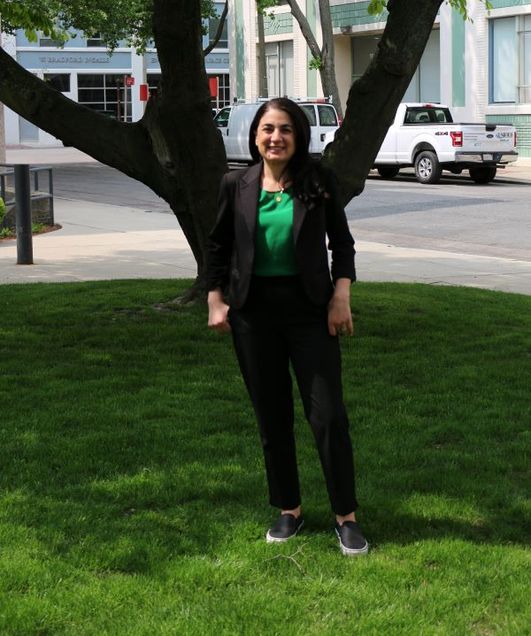Introducing the Assistant Dean for Outreach & Diversity
Meet ENG’s New DEI Chief
Pamela Audeh was named the BU College of Engineering’s Assistant Dean of Outreach and Diversity (ADOD) on March 1. She plans and runs initiatives that promote diversity, equity, and inclusion (DEI) in engineering, which count among the college’s primary strategic goals.

Audeh has a master’s degree in mind, brain, and education from Harvard University’s School of Education, with a focus on the cumulative effects of stress and trauma on learning and behavior, and a bachelor’s degree from UMass Amherst. She brings 25 years of experience and a passion for engaging research and clinical faculty with K–12 students.
What drew you to this position in the College of Engineering?
I have focused my career on providing social, emotional, and educational support and opportunities to youth and families from historically underrepresented groups in the STEM fields to support them in achieving their goals and dreams. Much of my career has involved establishing K–12 STEM education and volunteer programs which link out-of-school time to students’ interests, goals, and education and career aspirations. Prior to coming to Boston University, I was working at Brigham and Women’s Hospital Center for Community Health and Health Equity, a large teaching hospital in Boston running youth educational and work-based mentoring programs for primarily first-generation and students of color that spanned from pre-school to graduate school and beyond, with the focus of diversifying the healthcare and medical field. I would be remiss not to mention the differences in opportunities presented to students throughout their educational careers that can influence readiness to succeed in engineering. Inequities in housing, education, neighborhood safety, wealth, and many more all contribute. None of these factors are exclusive, and they often work together to influence an individual’s health, well-being, and quality of life, which directly impact education. I am keenly aware of the challenges first-generation and historically underrepresented students face throughout their education, but particularly when they enter college and face navigating a new world and the “hidden curricula” of college, on top of rigorous STEM courses. I was interested in providing support for students directly at a university, not just for those who are lucky enough to be involved with a program like the one I ran at Brigham and Women’s.
Why is outreach, diversity, and inclusion important for engineering?
Diversifying the engineering workforce is crucial for promoting innovation, creativity, and equity in society. By removing barriers and promoting diversity, we can ensure the engineering profession, and all the opportunity it affords, represents all communities and better serves the needs of all individuals. A lack of diversity in the engineering workforce perpetuates systemic bias in the design of technology, which can result in products that do not adequately serve the needs of underrepresented populations. For instance, facial recognition technology has been less accurate in identifying people of color, which could lead to false accusations or wrongful convictions—possibly changing the life trajectory of a family or individual. The same is true in medical device technology. The importance of having diverse perspectives in the design and development of technology to ensure that it is equitable and accessible for all cannot be understated. It has a direct impact on people’s health, well-being, and future prospects.
What are some opportunities you are pursuing?
There are so many opportunities I am excited about working on to support all students in the College of Engineering! The foundation of all successful support initiatives is building trusting relationships and engaging deeply with students, since they are the future engineers, faculty, and innovators.
I am interested in establishing a cohesive student support network involving staff, students, and faculty specifically in the college but also across the university. I am also interested in formalizing a mentorship program within the college. There are a lot of amazing people here already mentoring, and I would like to build on what is already happening here and make it easier for others to be mentors. I am hoping to add to and embellish the great work that is happening here in the college and at Boston University.